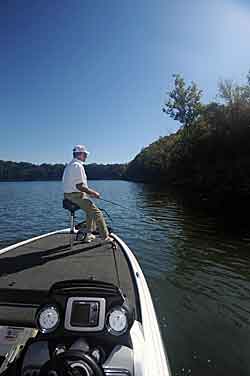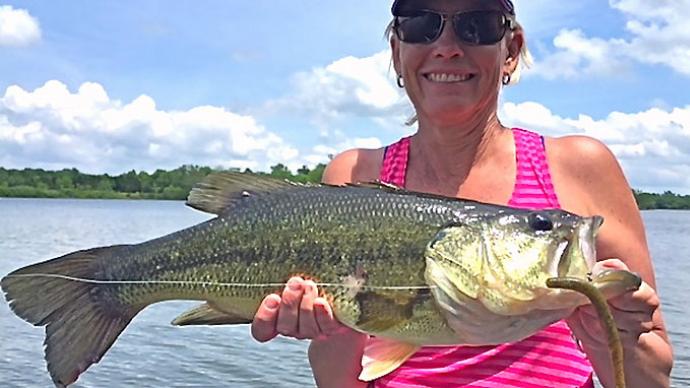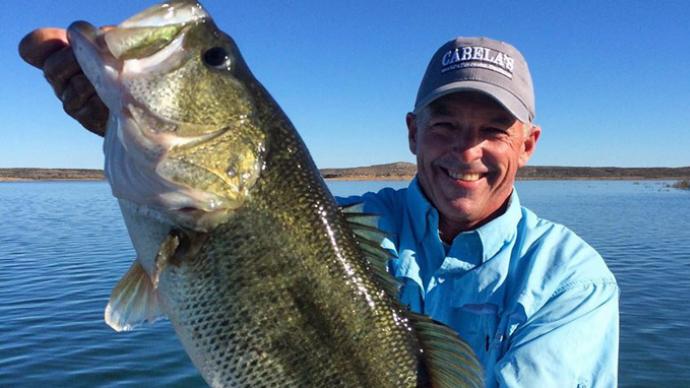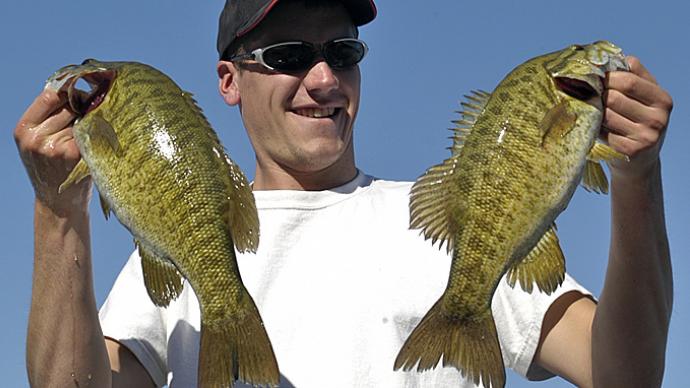
Recently a couple of friends got into a deep discussion about selecting a guide. In comparing their experiences, it became evident that in the past, there had been a wide array of results from their previous hires. It is appropriate to share a few thoughts on this process.
To begin with, I'd like to share an appropriate disclaimer that I have never guided for fees. But throughout my fishing career, I have gotten to know several guides, including some that are good friends. Any inkling that guiding might be something I wanted to explore was shaken into a dose of reality during a trip I took to Livingston while I lived in Houston. A friend of mine had done a considerable amount of fishing on Toledo Bend for crappie, but with a stopper and minnow rig on a Zebco 33 off a barge. He knew that I bass fished and, thanks to a tournament string featured in the Houston paper, asked if I would teach him and his son how to catch bass.
Like most bass fishermen then, I had a small boat by today's standards, but a cooler in the middle made a good seat. I went through the safety drill-life jackets, throw cushion, etc., and then explained how we must cast to ensure that the fish and not one of us got hooked. The youngster discovered that he would get a little more distance if he let out a little more line before the cast. Unfortunately, the father was in the back seat, and a couple of near-rod fusions occurred. This resulted in another counseling session, and silly me thought the warning was being heard.
Then it happened—a sound similar to a loud clap and an equally loud noise, like a bullwhip cracking. When I turned, the youngster was quite pale, and no sign of a spinnerbait was evident on his limp line. All ended well, mainly since the seat base was wood. The spinner's hook was buried in the base between his father's legs.
So the first important fact about being a guide is that while a client expects to catch fish, the guide is sensitized to the fact that he is responsible for their safety. So this brings up an initial question you should ask about the size and layout of the guide's rig. Many full-time guides note the type of boat and its horsepower so you can judge the potential comfort for yourself.
Inquiring about a reference is appropriate if you have particular concerns. If you choose, the marinas can direct you to a guide. The only problem with this concept is that it might be hard to get a negative reference if the facility already has the guide booking from their site. A previous person who has experienced a trip is the best source of information, followed by someone that fishes the lake and knows the guide as an individual. When I referenced information from a guide in past articles, it was because I know them to be very honest and will tell me or you about the success you should expect while fishing in their lake.
Recently I was introduced to a young man whose boss advised me was also an intense fisherman. He told me he was a part-time guide on Fork and that he had been catching "lots of bass." I made a fatal mistake and asked what size. The answer was up to 12 and 13 pounds. The last time I had that feeling was in a draw tournament where my partner for the next day informed me he didn't know whether to fish the four- or six-pound schools first. As I recall, we never found either of his concentrations of schools and had to work my fish.
Even an outstanding guide may have a rough day, but being with a good guide, just as with a good fisherman in general, will increase your chances to figure out patterns, whether or not other changes impact the fish.
There are guides, and there are guides. A full-time guide is a person who has chosen a demanding profession, and if they have a lengthy track record of guiding, either can live on a small income or have developed a client base because they are doing something right. There are some excellent part-time guides, but there are also a number of these who give boat rides. A friend of mine hired a guide on Lake Fork and reported that they saw a lot of the lake, but somehow another boat was already on spots his guide was going to fish. Gee, I wonder how they knew his spots?
A guide has to: 1. Like people and 2. Have patience (another reason I couldn't be one). Many of the folks who hire a guide feel it is better to invest in the periodic trip than to bear the expense of a rig that may not be often used. If you are wise and use a guide, it can be a learning experience. This may be one of the questions you ask - what do you usually fish with? The answer may be something you have no experience with but want to learn. Who is better than a guy who makes his living using a given technique to be your teacher? Also, be honest about your skill level and what you have fished with in the past. The guide can best serve you if he knows what tackle you can throw and how that does or doesn't fit how he will fish. The other option is to watch the guide fish, but there are better reasons to invest in a trip.
You are also hiring a guide, so tell them how long you want to fish and under what conditions. For example, do you want to go in when it is too cool or hot? What about fishing in the rain? Does this bother you? In the summer you might prefer to use a guide who fishes at night. These folks are making a living at this. It's reasonable for them to have a cancellation fee associated with some time interval since they may or may not be able to rebook.
A question is raised periodically about the benefit of using a guide who fishes and guides on one lake instead of one who lists a couple of lakes. This issue has two sides to answer. First, a person who concentrates on one lake should know it well, and the reason this guide would be given the choice is if the client wants "to fish this lake for a reason." For example, you want to try to catch a trophy bass. These fish are often thought of as more likely to come from certain lakes. On the other hand, if you want to catch numbers of fish, the same guide may fish in different areas on the same lake than he would have worked if asked to try to provide a big bass. If your preference is to catch numbers of fish, then this is the reason some guides shift lakes. For example, a given lake may become very hard to fish during the cold weather months, whereas a nearby power plant or warm-water lake becomes less affected by temperature drops.
During the arrangement of the trip cover specific issues such as what tackle you need to bring or who provides what? A long time ago, a fellow in our bass club typified several things you don't want in a guide. This was before license and insurance requirements. His desire to become a "backup" guide to some relatives who did guide was both inspired by a chance to pick up some weekend money and to attempt to find some of the relative's secret holes. Unfortunately, his boat wasn't very dependable and not very fast, so on the first day out with the overflow bookings, he was soon somehow on his own. He wasn't thrilled with how this was working out and became even more frustrated with the guys continually hanging up. The story got even spicier in that he finally told them to break off when they hung up. After they each broke off several lures, his conscience got the better of him, and he told them he would start to try to get their lures loose.
It was obvious that their losses were getting to be expensive. Fittingly their answer was, "don't worry, we are getting them from your tackle box." We all thought justice was being served. But the fundamental moral is a good guide is a professional and should be treated as such. Likewise, he should consider the importance of the trip to his client and make it as memorable as possible. Be considerate and tell the guide if you fish in the lake and how often. If you are using the guide to learn about the lake before a tournament (if allowed), tell them. The best approach is to maximize the learning part of the trip and avoid exploiting the guide trying to find his places to fish.
That is unless the rules are set early, and everyone agrees. Remember, the guide makes a living by returning to their favorite fishing spots. So beating up his fish actually threatens his livelihood.
I remember Al Eason, an outdoor writer and guide, telling me of a trip to Toledo Bend where a guy told him he really needed some fish for a Sunday school fish fry. This was when we were told keeping fish didn't hurt a lake. Even so, Al didn't take people to his secret number one spot unless they were from out of state and never took anyone to the place that even remotely lived in easy range of the lake. The honorable intent so touched him that he took the guy to the sacred spot, and they quickly had a limit. The place was easy to find if you just marked a couple of adjacent big trees. Eason noted that attendance in Sunday school was poor the next day because when he came in sight of the area, this guy and the whole class were fishing his spot.
Several guides invite anglers to call them for updates on the lake and will even offer suggestions as to the depths you should fish and the most productive lures. This is a real asset for a fast read on the lake's conditions. But don't abuse the courtesy.
To get the most out of a guided trip, treat them like teachers (hopefully, that still means with respect, but it also requires you do some homework) and pay attention in class.




